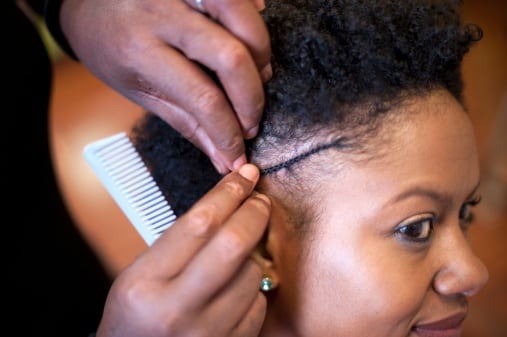Fibroids: Second Opinions Reduce Chance of Hysterectomy
When it comes to fibroid treatment, physician choice may have a great deal to do with the type of treatment you receive. Taking the time to get a second and even third opinion on whether or not you should have surgery increases your chances of finding a doctor who will offer a less invasive treatment, reports new research from the University of California at Los Angeles.
Nelly Tan, M.D., the leader of the study, followed 205 women who had been diagnosed with fibroids who came to UCLA’s multidisciplinary uterine fibroid center for a second or third opinion about what type of treatment would work best for them. Most of the women, who were an average age of 44, had already been offered hysterectomies by other physicians.
Non-cancerous uterine fibroids affect nearly 80 percent of black women, and we are two to three times more likely to experience severe, fibroid-related bleeding and other complications.
At the UCLA center, the women received separate evaluations by a gynecologist and a radiologist. Before coming to the clinic, the women had only been examined by a gynecologist or primary care provider.
They also underwent MRIs. An MRI, Tan explains, can distinguish between the three different types of fibroids better than a CT scan or an ultrasound, the two standard fibroid tests. After the tests, 109 of the women transferred their treatment to the center. 25 decided on no follow-up treatment. Seventy-six of the women had non-surgical fibroid treatments. Only 8 of the women had to have hysterectomies, a number that equals only 7.3 percent. Nationally, 70 percent of women who are diagnosed with fibroids are given hysterectomies.
Tan advised that “many women undergo hysterectomies for fibroids because they do not have enough information” about the severity of their condition or potential treatments. It’s also important to see a specialist for an evaluation before making a fibroid treatment decision.
A ‘Cup of Joe’ May Cut Diabetes Risk
A new study of coffee and tea consumption, among more than 90,000 women and men, found that people who increased their coffee consumption by one cup a day, over four years, had an 11 percent lower risk of developing type 2 diabetes. Study participants who decreased their daily coffee consumption by one cup had a 17 percent higher risk of type 2 diabetes. Tea did not produce the same results. This is not the first study to show this connection. Researchers speculate that certain compounds in coffee may affect blood sugar.
Meat Increases Heart Disease Risk, but Fat’s Not the Culprit
It’s long been-established that consuming fatty cuts of meat and lots of red meat may raise your cholesterol and up your odds of cancer and other health problems. But for decades, scientists have also wondered if there’s something else about meat, especially red meat, that causes heart damage.
A new study carried out by researchers at Indiana University reports that heme iron, the type found in meat (as opposed to non-heme iron which is in vegetable and other sources of iron) is most likely the problem. Heme iron has also been found to increase diabetes risk.
A review of 21 studies, with 292,454 participants, followed over 10 years, found that eating high amounts of heme iron can increase your chances of getting coronary heart disease by 57 percent.
Iron is a necessary nutrient, especially for people who are anemic, but your body responds differently to heme iron and non-heme iron. Heme iron is absorbed into the body at a very high rate (about 37 percent of all you consume). Whole non-heme iron is only absorbed at a rate of about 5 percent. The only way get rid of iron in the body is through menstruation, donating blood or bleeding.
Heme iron is thought to cause inflammation that damages the arteries. Protecting yourself is easy:
▪ Take the test: the next time you see your doctor, ask for a simple and inexpensive blood test to see if your iron levels are low, high or appropriate. Then follow your doctor’s advice.
▪ Watch your supplements. Do not take iron supplements unless you have been told you have a deficiency. Many foods, especially cereal, are already fortified with iron.
▪ Balance your diet with vegetables. Become a vegetarian two or three days a week. As long as you don’t fill up on high-fat fare, you’ll not only lower your risk of iron-related heart problems, you’ll cut your chances of developing cancer, diabetes and other health problems. You may even drop a few pounds.








